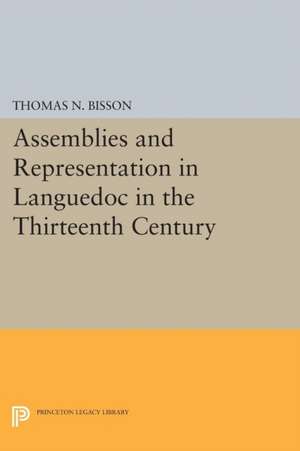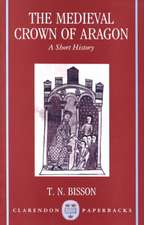Assemblies and Representation in Languedoc in the Thirteenth Century: Princeton Legacy Library
Autor Thomas N. Bissonen Limba Engleză Paperback – 11 feb 2016
| Toate formatele și edițiile | Preț | Express |
|---|---|---|
| Paperback (1) | 427.35 lei 6-8 săpt. | |
| Princeton University Press – 11 feb 2016 | 427.35 lei 6-8 săpt. | |
| Hardback (1) | 928.57 lei 6-8 săpt. | |
| Princeton University Press – 18 apr 2016 | 928.57 lei 6-8 săpt. |
Din seria Princeton Legacy Library
-
 Preț: 437.79 lei
Preț: 437.79 lei -
 Preț: 172.27 lei
Preț: 172.27 lei - 16%
 Preț: 683.62 lei
Preț: 683.62 lei - 16%
 Preț: 2324.07 lei
Preț: 2324.07 lei -
 Preț: 376.98 lei
Preț: 376.98 lei - 23%
 Preț: 780.24 lei
Preț: 780.24 lei -
 Preț: 377.30 lei
Preț: 377.30 lei -
 Preț: 313.18 lei
Preț: 313.18 lei - 16%
 Preț: 882.79 lei
Preț: 882.79 lei - 16%
 Preț: 736.39 lei
Preț: 736.39 lei - 16%
 Preț: 860.07 lei
Preț: 860.07 lei -
 Preț: 362.12 lei
Preț: 362.12 lei -
 Preț: 223.24 lei
Preț: 223.24 lei -
 Preț: 363.10 lei
Preț: 363.10 lei - 16%
 Preț: 915.46 lei
Preț: 915.46 lei -
 Preț: 340.21 lei
Preț: 340.21 lei - 16%
 Preț: 835.11 lei
Preț: 835.11 lei -
 Preț: 266.84 lei
Preț: 266.84 lei -
 Preț: 317.65 lei
Preț: 317.65 lei -
 Preț: 329.09 lei
Preț: 329.09 lei -
 Preț: 265.73 lei
Preț: 265.73 lei -
 Preț: 260.54 lei
Preț: 260.54 lei -
 Preț: 314.84 lei
Preț: 314.84 lei -
 Preț: 402.66 lei
Preț: 402.66 lei -
 Preț: 464.18 lei
Preț: 464.18 lei -
 Preț: 351.09 lei
Preț: 351.09 lei -
 Preț: 483.81 lei
Preț: 483.81 lei - 19%
 Preț: 500.29 lei
Preț: 500.29 lei -
 Preț: 388.44 lei
Preț: 388.44 lei -
 Preț: 328.48 lei
Preț: 328.48 lei - 23%
 Preț: 742.04 lei
Preț: 742.04 lei -
 Preț: 372.92 lei
Preț: 372.92 lei -
 Preț: 328.70 lei
Preț: 328.70 lei - 19%
 Preț: 505.89 lei
Preț: 505.89 lei -
 Preț: 446.25 lei
Preț: 446.25 lei -
 Preț: 289.17 lei
Preț: 289.17 lei - 19%
 Preț: 575.53 lei
Preț: 575.53 lei -
 Preț: 447.20 lei
Preț: 447.20 lei -
 Preț: 484.19 lei
Preț: 484.19 lei -
 Preț: 271.12 lei
Preț: 271.12 lei -
 Preț: 314.46 lei
Preț: 314.46 lei -
 Preț: 362.51 lei
Preț: 362.51 lei -
 Preț: 307.07 lei
Preț: 307.07 lei - 19%
 Preț: 498.46 lei
Preț: 498.46 lei -
 Preț: 272.27 lei
Preț: 272.27 lei - 19%
 Preț: 458.44 lei
Preț: 458.44 lei -
 Preț: 406.20 lei
Preț: 406.20 lei - 19%
 Preț: 515.73 lei
Preț: 515.73 lei -
 Preț: 428.88 lei
Preț: 428.88 lei -
 Preț: 369.27 lei
Preț: 369.27 lei
Preț: 427.35 lei
Nou
Puncte Express: 641
Preț estimativ în valută:
81.78€ • 84.86$ • 68.36£
81.78€ • 84.86$ • 68.36£
Carte tipărită la comandă
Livrare economică 17-31 martie
Preluare comenzi: 021 569.72.76
Specificații
ISBN-13: 9780691624716
ISBN-10: 0691624712
Pagini: 380
Dimensiuni: 156 x 233 x 21 mm
Greutate: 0.53 kg
Editura: Princeton University Press
Seria Princeton Legacy Library
ISBN-10: 0691624712
Pagini: 380
Dimensiuni: 156 x 233 x 21 mm
Greutate: 0.53 kg
Editura: Princeton University Press
Seria Princeton Legacy Library
Descriere
Descriere de la o altă ediție sau format:
The author demonstrates that medieval assemblies have a significant history well before the great age of parliaments and Estates. He deals with assemblies, council, and consent, and shows how the older procedures were transformed by the increasingly bureaucratic Capetian governments after the royal conquest of Languedoc in the 13th century. Origin
The author demonstrates that medieval assemblies have a significant history well before the great age of parliaments and Estates. He deals with assemblies, council, and consent, and shows how the older procedures were transformed by the increasingly bureaucratic Capetian governments after the royal conquest of Languedoc in the 13th century. Origin










